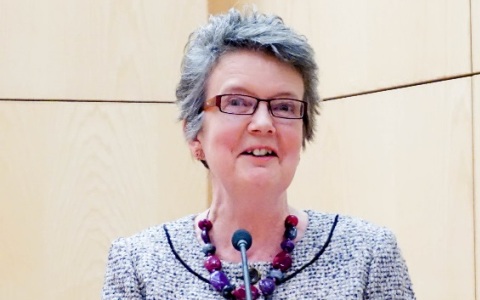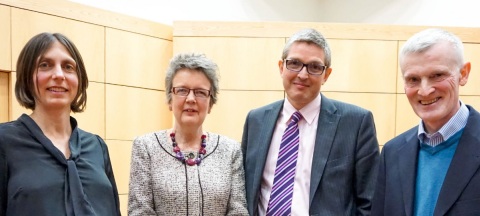Taylor gives Catherwood Lecture and says ‘Abandon divisive identity politics’
by - 30th April 2015

MULTICULTURALISM based on secularisation had damaged society and Christians must sponsor the will to engage more deeply, Dr Jenny Taylor told a Northern Ireland audience, giving the Catherwood Lecture in Public Theology.
Titled ‘When words fail: religious literacy and post-multicultural possibilities’, Taylor’s lecture at the Agape Centre in Belfast on 16 April argued that ‘multiculturalism has failed’ and the ‘social costs of secularisation –the so called separation of the secular from the sacred – have harmed the chances of a real encounter with others.’
She said: ‘This separation is at its worst the severing of our deepest motivations from our public life.’
Taylor contended that the past fifty years had seen a profound loss of Christian confidence.
Governmental attitudes to immigration – in promulgating ‘multiculturalism’ – had rendered society unable fruitfully to engage with other religious traditions, and with Britain’s own Christian heritage.
‘We simply dare not any longer even notice difference, let alone understand or truly encounter it.’
For Taylor, what made a ‘hospitable secular space’ possible was ‘the Christian Truth on which it was originally built: the Truth, founded upon the Cross that encompasses its own limitedness in all human apprehension of it.
‘The grace of God’s hospitality meets the truth of God’s judgement in the Cross when the powers of religion and the state are both equally unmasked and shamed.’
To instigate a truly plural future we must, Taylor concluded, ‘abandon divisive identity politics, test and repeal all laws and plans that tend to cause ghettoes, insist on reciprocal plurality with foreign countries we do business with, refuse to tolerate mere tolerance, and apply a sense of covenant by everyone in civil and social policies.’

The event was introduced by Dr Noel McCune, a retired NHS Child Psychiatrist. He chairs the Board of Contemporary Christianity, the successor body to ECONI (Evangelical Contribution on Northern Ireland).
ECONI helped broker the peace in Northern Ireland believing that ‘[w]here loyalty to political and cultural identities had obscured loyalty to Jesus Christ, Christians needed to rediscover what it meant to live for God and his glory alone.’
Vocabulary
Dr Gladys Ganiel, Research Fellow in politics and sociology at Queens University Belfast who undertook doctoral studies into the evangelical contribution to the peace process, observed differences between the situation described by Taylor on mainland Britain, and Ireland.
In her formal response to the Lecture, she said: ‘Despite the concerns and fears of many in our churches, secularism and secularisation have not taken root in Northern Ireland to the same extent as in the wider UK. Faith-based activists and commentators were never pushed from the public sphere. ‘
There had been a certain loss of influence, she said, which was a ‘good thing because it freed the churches from the dangers of being co-opted by political power.’
‘Free of this entanglement, religious actors can critique abuses of political power and stand with the poor and marginalized,’ she said.
Northern Ireland had been, and remained, caught in a ‘two communities’ or ‘two cultures’ paradigm that ignored people and groups who did not fit in.
This was changing in the Republic with increased immigration since the Celtic Tiger years.
But ghettoes were also forming by default, as government adopted a similar ‘hands-off policy’.
BBC Northern Ireland Presenter Will Leitch who gave the second response, agreed that religious literacy and a wider vocabulary were needed by all.
‘I believe it’s a challenge for the wider church to engage with, befriend and develop trusted relationships with the media world. And Jenny I applaud the work you are doing in that regard.’
Politician
The lecture, hosted by Contemporary Christianity was inaugurated in 1998 in honour of Sir Fred Catherwood, a British Conservative politician.
As well as serving in a number of political roles throughout his life, including Vice-President of the European Parliament, Catherwood was also Director of the National Economic Development Council, President of the Evangelical Alliance and the International Fellowship of Evangelical Students.
This was the first lecture since his death in November 2014.
